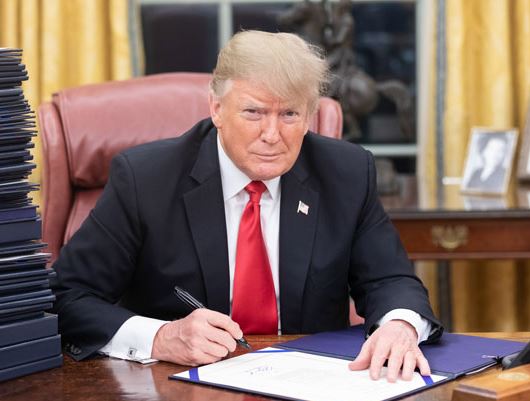In his first week back in office, President Trump issued a series of executive orders on issues ranging from immigration, climate policy, and diversity, equity and inclusion, some of which are expected to face constitutional challenges. Some of Trump’s most notable executive actions include withdrawing from both the World Health Organization and the Paris Agreement, an international climate treaty that former President Biden re-entered following Trump’s initial withdrawal in 2017. In addition, Trump eliminated Diversity, Equity and Inclusion programs in the federal government, pardoned January 6 defendants, and declared a national emergency at the Southern border. Trump also attempted to end birthright citizenship, a principle that confirms any child born in the United States is automatically a citizen. However, this initiative in particular is expected to face heavy constitutional challenges, as it directly conflicts with the language of the 14th amendment.
Professor Galdieri of the Politics Department, who is currently teaching a course on Presidential Power, explained the nature of executive orders to the Crier, sharing they are “instructions from the president to executive departments about how they should be carrying out their functions.” According to Galdieri, Trump’s executive orders bend norms of presidential power and resemble “efforts to reshape the relationship between the president and the rest of the government.”
Galdieri expressed that while some of these orders are more “sound and fury than substance,” others have the potential to “fundamentally shake up relations with different branches of the government.” In particular, Trump’s freezing of federal grants and loans challenges Congress’ historical power to the purse. As laid out in Article 1 of the Constitution, Congress, not the president, has control over public spending. It is historically understood that based on this, Congress has the sole power to appropriate funds, with the president overseeing the spending of these appropriations. “There is a reason why two judges put this federal freeze on hold, for it is so out of the ordinary,” Galdieri explained.
Professor Anne Holthoefer, who specializes in international relations and organizations, provided insight regarding the administration’s decision to withdraw from the World Health organization and Paris Agreement.
“The World Health Organization (WHO) and the Paris Agreement represent efforts to address global collective action problems, that is, political challenges such as the control of infectious diseases and climate change that no single country can solve alone. They require international cooperation because each state has an incentive to free-ride, hoping others will bear the financial and political burden,” Holthoefer shared. “To overcome these kinds of cooperation problems, states create institutions like the WHO and treaty regimes like the Paris Agreement to coordinate action, share information, pool resources, and enforce commitments.”
According to Holthoefer, the World Health Organization “helps combat communicable diseases such as Polio, River blindness and Malaria by collecting and disseminating health data, providing financial and technical assistance, and drafting international health regulations. It also identifies global health emergencies, such as cholera outbreaks or the COVID-19 pandemic. In response to these emergencies it issues policy recommendations, travel warnings and may organize resource sharing.”
Holtheofer went on to explain the incentives and drawbacks of Trump’s decision to leave the WHO, acknowledging that “The U.S. benefits directly from this system, as diseases do not respect borders, and international coordination is crucial for pandemic response. Not only may the U.S. lose access to the scientific data that the WHO collects and distributes, it is also giving up its seat at the table to shape the international response to health threats.”
At the same time, Trump’s decision to leave the WHO reflects a popular sentiment among Americans that as a global power, the United States contributes disproportionately to international organizations without getting control over spending in return. “WHO members pay an agreed-upon fee based on their national income (the higher the GDP, the higher the membership fee) but most of the WHO is financed through voluntary contributions. Resource pooling means that funds are allocated collectively, without special privileges for larger contributors,” Professor Holtheofer illustrated.
Similarly, President Trump believes that the Paris Agreement places an unfair financial burden on the United States. However, Professor Holtheofer explained that while the agreement “imposes legally binding obligations on states to address climate change, states set their own emission targets and face no formal penalties for non-compliance. There is no question that addressing climate change is politically and economically costly, but the Paris Agreement exists because inaction carries far greater consequences.”
It is important to remember that the United States’ withdrawal from these organizations will not end global initiatives on public health research and climate change response. Regardless, the significance of one of the world’s largest economies scaling back its international commitments should not be underestimated, as other countries may be encouraged to do the same.
Just one week into Trump’s second term, it is clear that he intends to fulfill his campaign promises to “drain the swamp,” crack down on immigration, and withdraw from global organizations that are seen as having bad deals for the American economy. On domestic policies, Trump’s executive orders test the extent to which a Republican controlled Congress will comply with a steady increase in presidential power.


